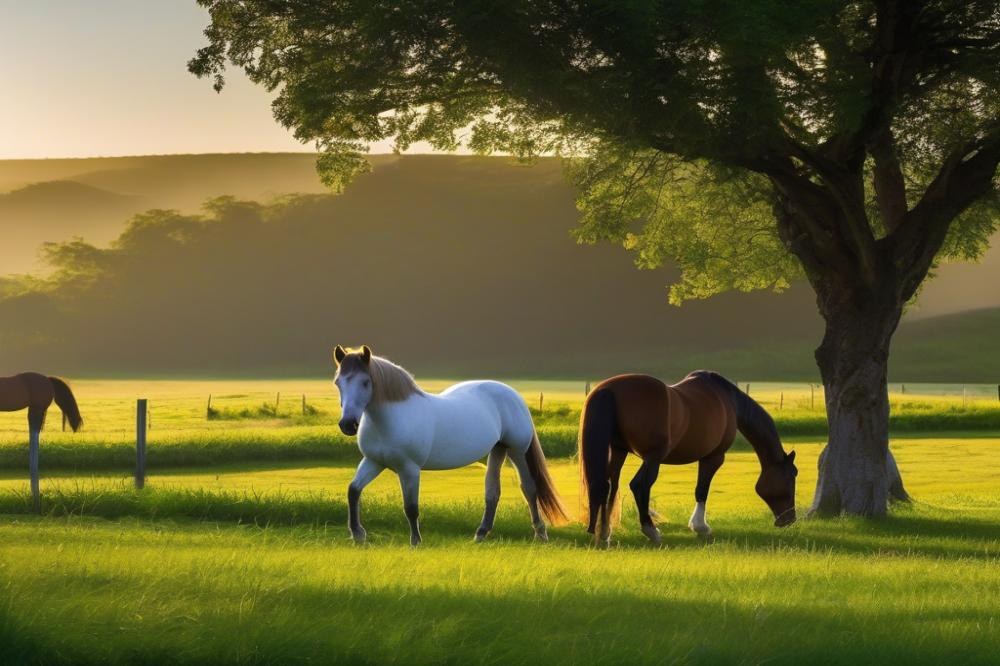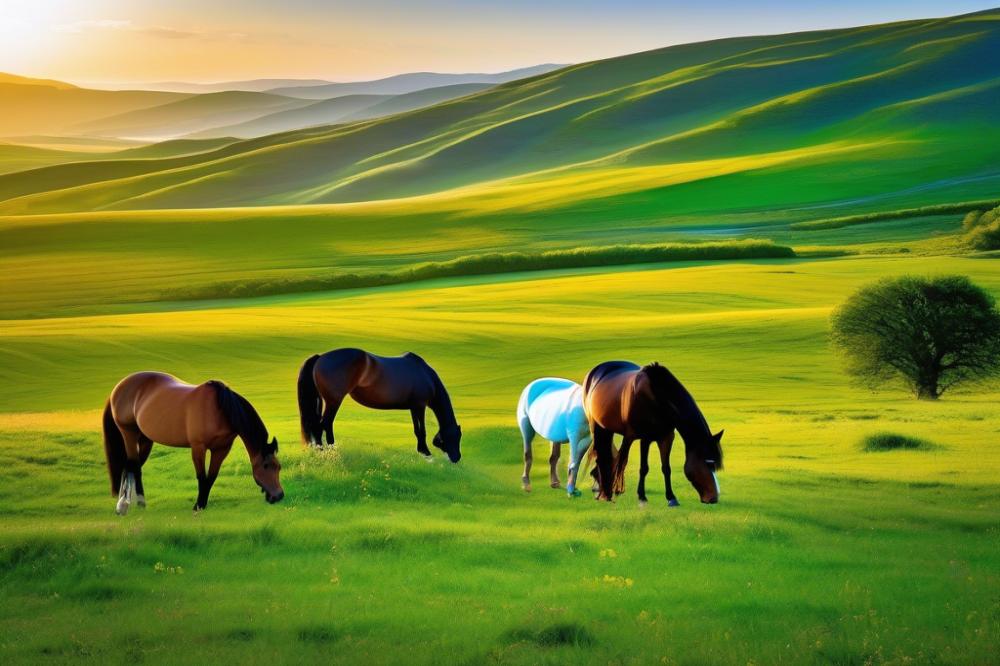Overview of the Importance of sustainable breeding
Breeding animals responsibly is critical for our planet. The choices made today will affect future generations. Healthy ecosystems depend on balanced relationships among species. When we breed, we shape the genetic future of animals. This has lasting impacts on their health and the environment.
sustainable breeding practices help protect natural resources. They also favor animal welfare and biodiversity. Without these practices, we risk damaging the very systems that support life on Earth. Our methods can either promote or harm the environment. Through careful breeding, we can produce animals that thrive while also preserving their habitats.
Many people may not realize how our actions today echo into the future. Each generation inherits the results of breeding decisions. If we focus on eco-friendly practices, we can create strong, adaptable breeds. This will lead to healthier animals that can withstand changing environments and diseases. Additionally, it helps maintain genetic diversity, which is vital for resilience.
Sustainable breeding is especially relevant in horse breeding today. Horses are integral to many cultures and livelihoods worldwide. By practicing responsible breeding, we honor their legacy. We can foster robust bloodlines that are well-suited for various tasks, from riding to farming. As stewards of these animals, it is our responsibility to make choices that serve both the horses and the planet.
Sustainable Breeding

In recent years, breeding practices have evolved to focus on sustainability. This approach emphasizes health and longevity, aiming to produce animals that thrive in their environments. Carefully selecting breeding stock is key to achieving these goals. Breeders should evaluate various traits, including physical health and temperamental stability, before making choices. By integrating scientific insights with traditional practices, we can improve the outcomes for future generations.
Importance of genetic diversity
Genetic diversity plays a critical role in breeding programs. A diverse gene pool can protect against inherited diseases and other health issues. When breeding animals with a broad range of traits, the chances of producing offspring with strong immune systems increase. This diversity also makes the population more resilient to environmental changes. Therefore, breeders should strive to mix different bloodlines to maintain this variety. A careful balance between uniqueness and compatibility is necessary for success.
Role of Ethical Breeding in Horse Welfare
Ethical breeding is essential for ensuring horse welfare. This practice revolves around the humane treatment of animals throughout the breeding process. Breeders must prioritize the health and happiness of both the mare and stallion. Avoiding practices that induce stress is crucial. Providing adequate living conditions and proper care contributes to the overall well-being of the horses involved. Additionally, breeders should educate themselves about responsible breeding methods. Such knowledge not only promotes animal welfare but also fosters a positive relationship between horses and humans.
Animal Welfare Considerations

Connection between sustainable breeding and animal welfare
Sustainable breeding practices focus not only on improving animal genetics but also on their overall well-being. Caring for animals in breeding programs means providing environments that promote comfort and health. Stress-free surroundings lead to better reproductive outcomes. When we prioritize animal welfare, we ultimately create healthier populations. This connection helps in achieving long-term sustainability in breeding efforts.
Best practices in horse care during the breeding process
Proper care during breeding is essential for the well-being of horses. First, ensure that the horses have spacious and clean living conditions. Regular veterinary check-ups check for any signs of illness. Nutrition plays a critical role too; horses require balanced diets tailored to their specific needs. Monitoring behavior is also crucial. Observing their interactions can indicate their comfort levels. Using gentle handling techniques can help reduce stress during the breeding process. Providing plenty of water and safe shelter protects their health.
Impact of welfare on genetic diversity and population health
Animal welfare directly influences genetic diversity. Healthy animals are more likely to reproduce successfully. A limited gene pool can lead to vulnerabilities in populations. Prioritizing the well-being of all animals encourages more robust lineage. Breeding practices that respect and uphold welfare increase the chances of producing resilient offspring. This contributes positively to the overall health of the population. In summary, animal welfare practices form the backbone of robust breeding programs. Promoting these practices is essential for future generations.
Agroecology and Sustainable Practices

Introduction to agroecology in the context of horse breeding
Agroecology blends agricultural practices with environmental awareness. In horse breeding, this approach focuses on developing methods that are both productive and respectful of ecosystems. Rather than relying solely on synthetic inputs, breeders look towards natural solutions. This way, they can create healthier environments for both horses and the land they inhabit. Local resources play a significant role in this practice. By utilizing what is available, breeders can reduce waste and foster a sense of community.
How crop rotation and organic farming contribute to sustainability
Crop rotation is a central method used in sustainable agriculture. This practice involves growing different types of crops in succession on the same land. Doing so helps maintain soil fertility and reduces pest problems. Organic farming also emphasizes the use of natural fertilizers and avoids harmful chemicals. These methods are beneficial for sustaining the land over time. Healthier soils yield better crops, which can support equine well-being. Organic practices often lead to more nutritious feed for horses, improving their health and performance.
Benefits of integrating biodiversity conservation into breeding practices
Biodiversity plays a crucial role in the health of any ecosystem. When breeders focus on conserving various species, they enhance the resilience of their operations. This can mean protecting different plant varieties that serve as forage for horses. More plant variety leads to better nutrition for the horses and supports surrounding wildlife. Integrating diverse species into breeding practices fosters a balanced environment. A robust ecosystem can also help reduce disease transmission among animals. The harmony created through these practices ultimately benefits future generations, ensuring a legacy of care for both horses and nature.
Climate Resilience and Sustainable Agriculture
Climate change poses significant challenges for horse breeding. Rising temperatures can affect the health of horses and their ability to thrive. Unpredictable weather leads to variations in forage availability, impacting nutrition. Furthermore, increased frequency of droughts and floods threatens pasture lands. These conditions compel breeders to adapt their practices.
One strategy for enhancing climate resilience involves selective breeding. By choosing horses that possess traits suited to harsher climates, breeders can develop stronger populations. This could include selecting animals with better heat tolerance or those more resilient to diseases. Another option is to emphasize genetic diversity. A broad gene pool can improve the chances of survival in changing conditions.
Practices in sustainable agriculture also play a vital role. Healthy soil and diverse crops support the overall ecosystem. When land is managed sustainably, it can provide better nutrition for horses and other livestock. Crop rotations can lead to improved soil fertility. This, in turn, supports better pasture for equine diets. Integrating animals and crops creates a more balanced and resilient system.
Utilizing cover crops can help prevent soil erosion and maintain moisture. These practices create a healthier environment for breeding operations. Water management becomes crucial as climate patterns shift. Efficient irrigation systems and rainwater harvesting can reduce stress on natural resources.
Incorporating agroecological principles can also assist in building resilience. This means respecting local ecosystems and working with natural processes. Breeders might find that using native plants alongside traditional horse pastures can enhance sustainability. All these efforts contribute to creating a breeding environment that withstands the pressures of climate change.
Future Generations and Ethical Breeding
Considering future generations is crucial when making breeding decisions. Each choice a breeder makes can impact animals for years to come. These choices affect health, temperament, and genetic diversity. A wise approach focuses on the long-term well-being of offspring.
Practices that promote a diverse gene pool lead to healthier animals. Genetic diversity is vital for reducing the risk of hereditary diseases. By allowing natural selection to play a role, breeders can maintain strong lines. Healthier animals can better adapt to changes in their environment.
Creating a culture of responsible breeding is essential for the community. Breeders and owners need to communicate openly about the importance of their roles. Educational resources can help share best practices. Workshops and discussions can inspire a sense of responsibility among peers.
Support from experienced breeders can guide newcomers. Mentorship plays a part in fostering ethical standards within breeding practices. Together, breeders can build a network focused on the well-being of animals. Prioritizing ethical considerations strengthens the breeding community.
Ultimately, the goal should be to lay a solid foundation for the future. When breeders think about the next generation, it promotes a better environment for all animals. Awareness of breeding impacts leads to smarter decisions. A shared commitment to health and ethics benefits everyone involved.
Final Thoughts on Breeding for a Brighter Tomorrow
Sustainable breeding holds great significance for the future of our horses and the ecosystems they inhabit. Making the switch to better practices benefits not only the animals but also the environment. Responsible breeding can play a crucial role in maintaining genetic diversity, which is vital for the health of horse populations. A healthier breed means stronger animals that can thrive in various conditions.
Every breeder has a part to play in this journey. Embracing practices that prioritize the well-being of both horses and the land is essential. It’s time to explore new strategies, integrate principles of agroecology, and invest in the long-term health of our equine companions. By adopting these methods, breeders can cultivate a more resilient future and positively impact their communities.
Imagine a world where the bond between humans and horses is strengthened through care and consideration. Picture herds flourishing thanks to a commitment to ethical practices. This vision is attainable if breeders take action now. Change may not occur overnight, but every small step contributes to a larger movement. Together, we can establish a legacy of sustainable practices that will serve future generations.
In summary, the pathway to a better future for horses lies in our hands. Let’s commit to sustainable breeding practices today. By doing so, we not only honor our past but also safeguard the well-being of future generations of horses. The time to act is now. Together, we can create a resilient ecosystem that benefits everyone.



